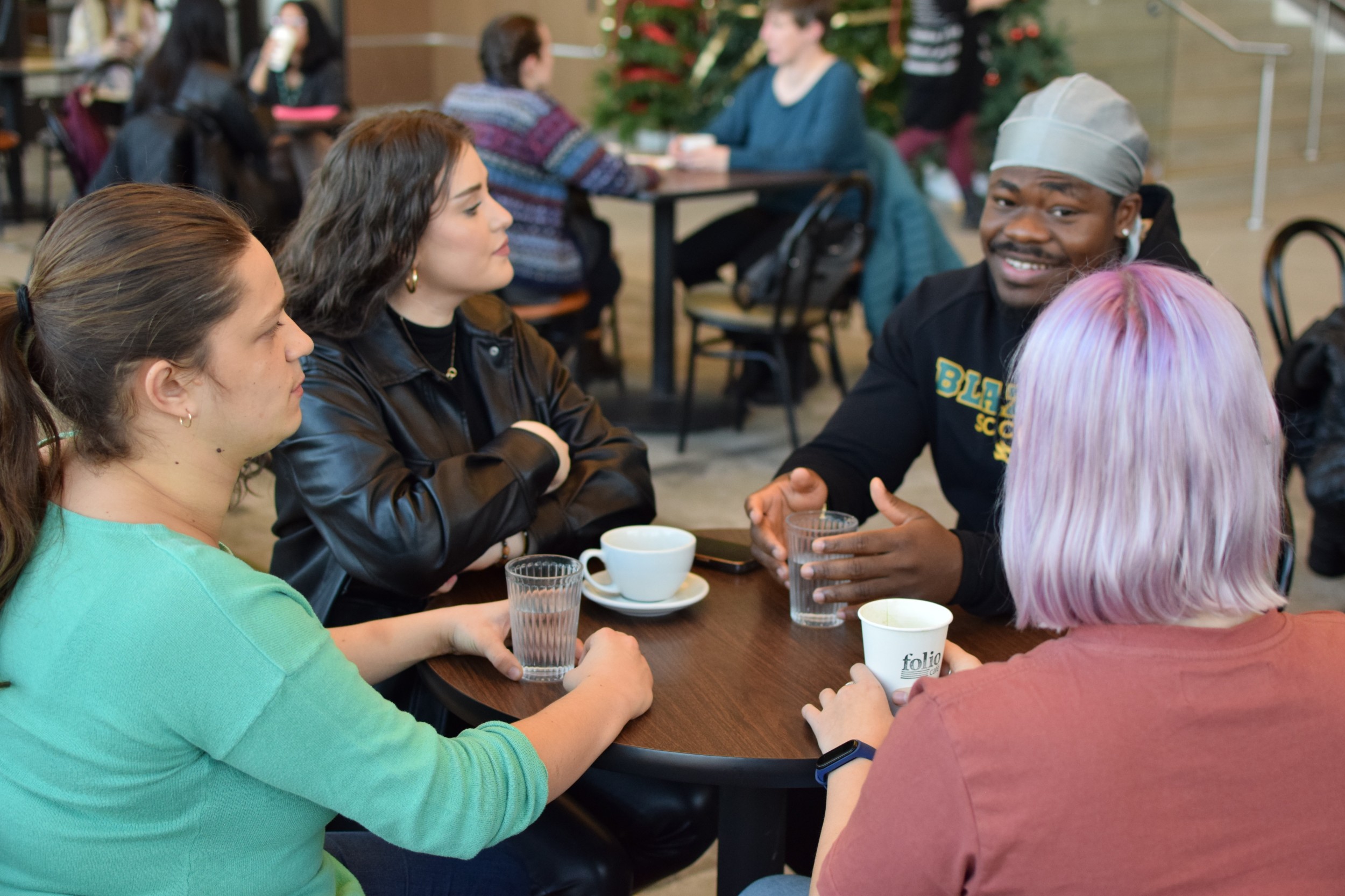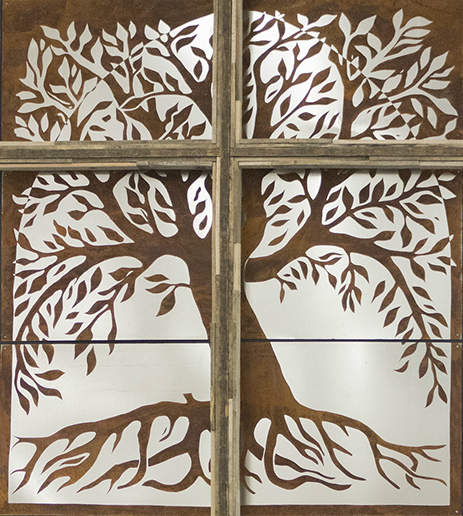Curious about a Mennonite University?

Answers to common questions about CMU
At CMU, education is more than acquiring knowledge—it’s a transformative journey of discovery, connection, and purpose. Here, you’ll wrestle with big ideas, refine your voice, and grow in wisdom, character, and faith. You’ll be challenged to think deeply, write clearly, and live courageously so that you graduate ready to contribute meaningfully to the world around you.
Here are answers to some of the most common questions to help you explore what makes this place truly unique.
How is CMU regarded within the broader academic and professional community?

CMU is highly respected for its distinctive integration of rigorous academics with a values-based, Mennonite-informed perspective. As a fully accredited member of Universities Canada, CMU meets the national standards for degree-granting institutions, ensuring its programs and credits are widely recognized and fully transferable across Canada and internationally. Its programs in arts, science, and social work are especially well-regarded -- "spanning theology, peace and conflict studies, biology, business, music/music therapy, social sciences, and the humanities. The university's commitment to interdisciplinary learning and guaranteed work-integrated learning placements sets it apart, ensuring students gain practical work experience alongside classroom study. Faculty are recognized both as scholars and dedicated mentors who foster critical inquiry and personal growth.
CMU graduates who go on to advanced studies at the master's and doctoral levels often report back that CMU prepared them incredibly well for the writing, research, and academic rigour that's required. Alumni attending both local and ivy-league universities, and everywhere in between, credit CMU for teaching them how to read deeply yet efficienty, think critically, and write at an appropriate level and in the proper style for the context. CMU graduates report sailing through their studies relative to their peers coming from other undergraduate programs.
Employers and community partners often praise CMU graduates for their thoughtfulness, integrity, and ability to tackle complex social issues with empathy and practical skill. The university's smaller scale is seen as a strength, cultivating close-knit academic communities and a personalized approach that has earned CMU a strong reputation in Manitoba and beyond. In particular, CMU is considered ahead of the curve for making work-integrated learning central to every undergraduate degree -- a commitment many larger institutions are only now trying to replicate. Just as important, CMU integrates the spiritual and moral dimensions of life throughout its curriculum, encouraging students to reflect deeply on who they want to be, equipping them for principled, effective leadership in a rapidly changing world.
What commitments shape the Mennonite tradition?

Community: Mennonites emphasize community life where all voices matter. Decisions are often made through collective discernment, reflecting the belief that faith is best lived in relationship with others.
Discipleship: Faith is not primarily a set of beliefs but a way of life. Discipleship means following Jesus daily, shaping one's choices and commitments in light of his life, teachings, death and resurrection.
Service: Compassion leads to concrete action. Mennonites are known for service that responds to human need - locally and globally - putting faith into practice through working with others for society's wellbeing.
Peace: At the heart of the Mennonite tradition is a commitment to active nonviolence. Mennonites seek to follow Jesus' call to be peacemakers, resolving conflicts without violence, and working towards reconciliation.
Justice: Mennonites pursue justice by standing in solidarity with the marginalized. This commitment calls for recognizing and addressing systems of inequality, guided by a vision of human dignity for all.
How does the Mennonite tradition shape CMU?


Community first: Learning happens in small classes with genuine two-way mentorship. Shared meals and conversation are central to campus life, fostering real relationships.
Radical welcome: CMU welcomes people of all faiths and no faith. Everyone belongs here - everyone's voice shapes what matters and what is learned.
Faith in action: CMU lives out commitments to environmental well-being, justice, peace-building, service, and Indigenous reconciliation - not as slogans but as daily practices.
Service and experience: Students gain work-integrated learning and job experience that prepares them to make a meaningful impact in their communities and beyond.
Character and citizenship: Education at CMU is about shaping ethical, engaged, and thoughtful people prepared to serve the common good and all of society.
Shared life: Staff and students eat together. CMU maintains equitable salary structures to reflect its values of justice and community.
Voluntary chapel: Held twice a week, chapel offers an open space for conversation, reflection, and exploration of faith.
Why does the Mennonite tradition matter (even if I'm not Mennonite or Christian)?

The Mennonite tradition at CMU is a foundation. Not a fence.
Why it matters for everyone:
- Students are known: At CMU, people notice and care. Students are not just a number - relationships matter here.
- Rigorous academics with support: Expect challenging, meaningful learning with professors and peers who help students to succeed.
- Required work-integrated learning: Every student gains real-world experience through placements and projects that build skills and insight.
- Commitments to generosity, fairness, and responsibility: These principles guide how we learn, work, and live together as a community.
- Employers notice CMU grads: CMU graduates are recognized for their character, critical thinking/writing, and capacity to make a difference.
Why it doesn't need to matter to you:
- You don't need to believe what Mennonites believe: CMU welcomes students of all faith backgrounds - or none at all.
- Faith is part of the conversation, not the conclusion: Simply put, spirituality is part of life. Questions of meaning, purpose, and values are explored openly, without forcing agreement.
- Doubt, curiosity, questions are invited: This is a place where honest inquiry is encouraged, and no question is unwelcome.
What does studying at a Mennonite university mean for a student's day-to-day experience? Will religion be talked about in every course?


At CMU, faith is part of the environment but it's not imposed. There are no expectations that everyone shares the same beliefs. Courses in all disciplines explore big ideas - about meaning, ethics, and responsibility - but not every class is "about religion." In theology classes, of course, spirituality is central to the discussion. In other subjects, it might come up as one perspective among many, or not at all, depending on the topic.
You'll find an openness to talking about faith, doubt, and values across campus life - from informal conversations to voluntary chapel gatherings twice a week. No one is required to attend chapel or to hold particular beliefs. The goal is to create space for honest questions and respectful dialogue, recognizing that students bring many different worldviews.
Will students be treated differently if they are Indigenous, Muslim, Jewish, agnostic, or atheist?

No, CMU welcomes and celebrates students from all spiritual backgrounds - and none. Students will not be treated differently because of their religious or cultural tradition or lack thereof.
CMU is committed to generous hospitality, respectful dialogue, and learning from diverse perspectives. Whether a student is Indigenous, Muslim, Jewish, agnostic, atheist, or anything else, they'll find a community that respects their identity and encourages open conversation. Faith is part of the campus culture, but it's never a prerequisite for belonging or success here.
Will a 2SLGBTQ+ student feel safe and fully included at CMU?

Yes, CMU works at this every day. CMU is committed to being a welcoming, respectful, and safe environment for all students, including those who are part of the 2SLGBTQ+ community. Many 2SLGBTQ+ students have found CMU to be a place where they can learn, grow, thrive, and be known in community.
As CMU is a Christian university rooted in the Mennonite tradition, people here can hold diverse theological perspectives, including on sexuality. Conversations about faith and sexuality are part of campus life, and they can be honest, sometimes challenging, but always seek mutual respect.
CMQ is the queer student advocacy and support group dedicated to 2SLGBTQ+ students and allies on campus. CMQ provides a safe space for connection, dialogue, and community-building. Through events, conversations, and advocacy, CMQ works to raise awareness, foster inclusion, and ensure that the voices of 2SLGBTQ+ students are heard and respected within the broader university community.
Faculty and staff treat all students with dignity and care. Discrimination or harassment is not tolerated.
The goal is to ensure everyone is treated with fairness, dignity, and unconditional positive regard. If you or your family have specific questions or concerns, we encourage you to reach out to talk directly.
Will a conservative, evangelical Christian feel safe and fully included at CMU?


Yes, CMU works at this every day. CMU welcomes students from many faith traditions, including those from conservative and evangelical backgrounds. The Mennonite tradition emphasizes the authority of Scripture, the importance of personal faith in Jesus, and a community that listens well and respects differences within the body of Christ.
At CMU, students are encouraged to grow in their faith, deepen their understanding of the Bible, and practice following Jesus in daily life. Faculty and staff are committed Christians from various traditions who value honest questions, deep conversation, and spiritual growth without pressuring anyone to conform to a single viewpoint.
Evangelical students here live out their convictions, find Christian fellowship, serve others, and participate fully in campus life. CMU aims to treat everyone with fairness, dignity, and Christlike love. If you or your family have specific questions or concerns, we invite you to reach out to talk directly.
Will CMU tell students what to think about social issues?

No. CMU is a university that welcomes complexity and difference - because education is not about conformity, it's about transformation. Students might not agree with everyone they meet here. They likely won't, but that's part of the point. CMU doesn't exist to deliver fixed answers, but to foster thoughtful, informed, and respectful engagement with difficult questions.
Some will find CMU too progressive, others too traditional. The richness of this place lies in its refusal to be easily categorized. CMU aims to form people of character who can hold tension, listen deeply, and act with conviction - even in disagreement.
What courses are required? Are faith courses required?

All universities require students to complete certain core courses in order to complete a degree. CMU students choose from a range of diverse and interesting courses to meet basic requirements in science, social science, the humanities, and theology. These courses also span diverse modes of learning - from hands-on making, to writing, work-integrated learning, and engagement with Indigenous and Anabaptist/Mennonite perspectives, ensuring students encounter multiple ways of knowing and are equipped to directly connect their education to their future career opportunities.
What is the transferability of CMU courses and degrees?

CMU degrees are fully recognized and transferable across Canada and beyond. CMU is a recognized member of Universities Canada, ensuring that credits earned here meet rigorous national academic standards. CMU students successfully transfer credits to other universities and successfully earn entry into competitive professional and graduate programs.
If you are considering transferring credits from another institution to CMU - or vice versa - it's best to consult with our admissions team early in the process. They can help assess your specific situation and provide clear guidance on which credits will transfer.
Why should a student consider living in residence at CMU?


At CMU, residence is not simply student housing. It's a meaningful part of the whole educational experience, giving students space to move beyond academics into personal growth and belonging through community building.
Not living in residence comes with real financial costs - money spent on gas, transit, and parking that could be saved or better invested. The time costs of commuting add up too, cutting into hours that students could use for studying, socializing, or simply resting. There are also carbon costs to consider, as daily travel increases your environmental footprint.
Studies consistently shows students living in residence earn higher GPAs than their off-campus peers.


 Print This Page
Print This Page